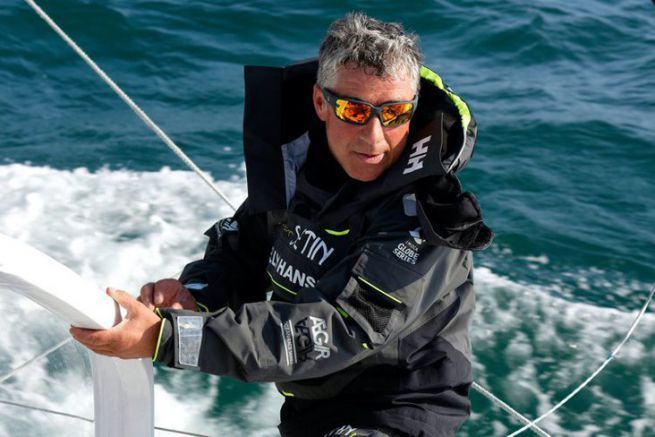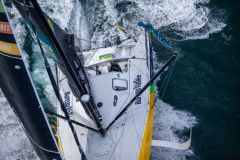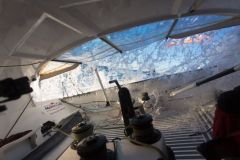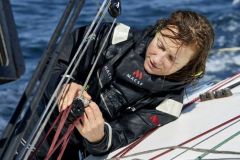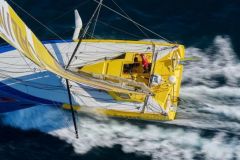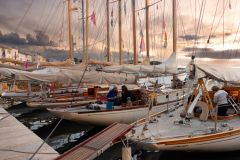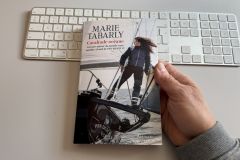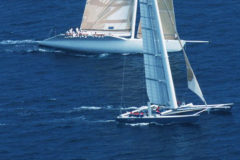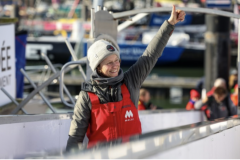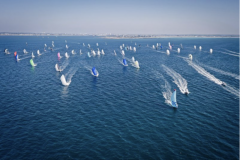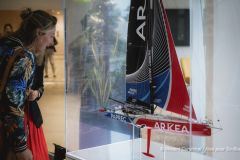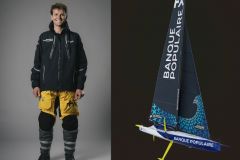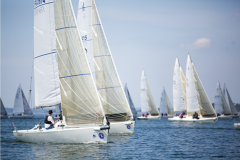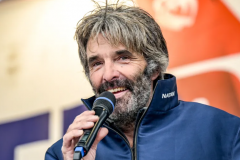Originally from Normandy, he settled in the Vendée, in Les Sables d'Olonne, to make a living from sailing. Competitor at heart, he was first interested in regattas, and finally became passionate about ocean racing. At the age of 52, he came 22nd in the last Transat Jacques Vabre with his IMOCA n°71 "Groupe SETIN".
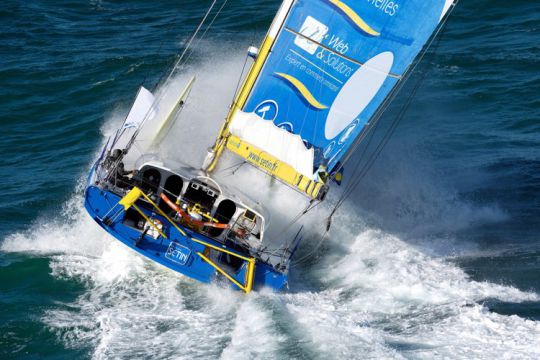
The view
It's all about color. Two years ago, I was racing the Route du Rhum. I was in the middle of the ocean, in the middle of the trade winds. One day, in the late afternoon, I saw a squall coming. Usually over there. They're more or less strong... this one was impressive! I saw it catch up with me: a big, very dark cloud which gradually grew in the blue sky, until it invaded it. The storm is upon me. A violent gust of wind, and the sky is uniformly deep black, turning purple. Or the other way around. I'm in a downpour. A downpour is coming down on me. A deluge of grey too. It's a vision that I remember so well... Probably also because my boat, which is very brightly coloured, on the contrary, like yellow and blue, contrasted so much with its surroundings at the time! In short, a quarter of an hour later, the squall passed. The sky turned blue again and the sun was shining again. And there, a rainbow, as I have rarely seen: magnificent! And so big, going from one end of the ocean to the other. That's the luck we have at sea: to be able to admire immense ones that round out the horizon.
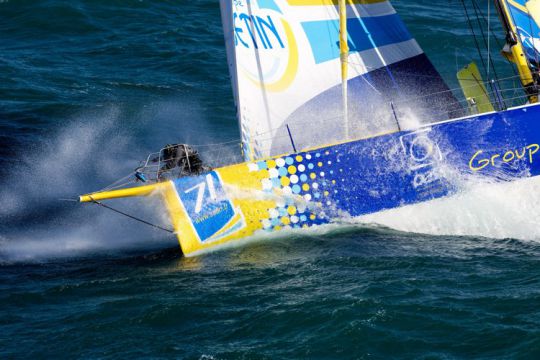
The touch
With my team mate, during the last Transat Jacques Vabre, when we reached the Doldrums, we were wiping out a powerful squall. It's night time. We missed a manoeuvre: the spinnaker didn't sink properly and fell into the water in part. There's no way we're going to let it go into the ocean: we can still use it! This enormous sail, which I now think looked like a large trawl net full of fish, was so heavy that we pulled on it in the middle of the gale like the damned. And for nearly two hours... Three or four times in a row we thought we'd managed to get it out of the waves, but they were again delighting us. Almost on board, and finally out of the water, and again and again: these back and forth movements of our hands on nylon only added to the burns on the wounds that every skipper has on his hands. And then there was the cramps, the tetanization. Of our arms and fingers. We had held them so long and so tightly to the canvas that opening them had become almost impossible. An intense stiffness of the muscles, which contrasted, there again, with the kind of softness of the surface of our hands due to the mixture of water and salt that had withered our skin. Our hands were in bad shape..
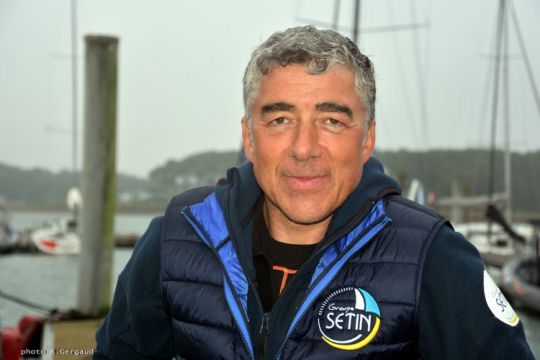
Hearing
During the Transat Jacques Vabre 2015, the first for me (in Class40), I experienced sailing conditions I'd never experienced before. Three or four successive lows, with winds sometimes reaching 50 knots and rough seas, of course. The boat was jumping on the waves: that's the image I still have of it! It even seemed to take pleasure in jumping high and then collapsing all of a sudden, jumping again, then collapsing again... But I was very far from that state of mind! It was making such a noise as it fell back into the water: like a very dry and strong fibre crack... I really had the impression that it was going to break up after each wave. And that was all I could hear, it was frightening: the wind was also howling, in the full sense of the word, and it came crashing so loudly into the shrouds. The noise lasted and lasted... I could hear it for almost 24 hours, without stopping! Then followed, when I had passed the depression, a few hours of lull. But, with the next depression, everything resumed... including this tempestuous sound mixture which, really, impressed me then. It would probably be less the case today, because I have more experience and I've got used to it, but the first time you hear it, I assure you... In short, after four or five days, the conditions finally calmed down. I then felt an intense sense of well-being: what incredible satisfaction I felt that day to have survived a super hard time!
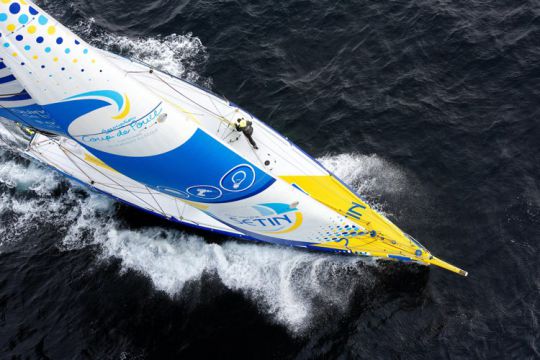
Taste
I have two tastes in mind. Toothpaste first, but not toothpaste at any given time... When I sail in difficult conditions for two or three days in a row, no, I don't necessarily wash every morning as I enjoy doing on land! I'm on something else, to tell the truth, and if I'm taking care of myself then it's mainly, more basically, so as not to fall over, for example ! But after the storm, there, yes, I make myself clean. And, in the morning, brushing your teeth with toothpaste is very pleasant. Coming out of this sort of dirty cave where you've had to stay too long, to find yourself out in the open air, your mouth fresh and full of that little minty taste of my toothpaste... it makes me feel, in a way, brand new! My second memory is the sweet taste of a freeze-dried vanilla cream. I think it's very good... at least when I'm at sea, because on land, even if I'm greedy enough, I wouldn't have the idea of eating it! But on board, these spoonfuls are a real treat for me. I love their vanilla flavour and their sweet consistency too. This cream must also resemble a madeleine, for me, from Proust of course... Vanilla cream is a child's pleasure, isn't it?!
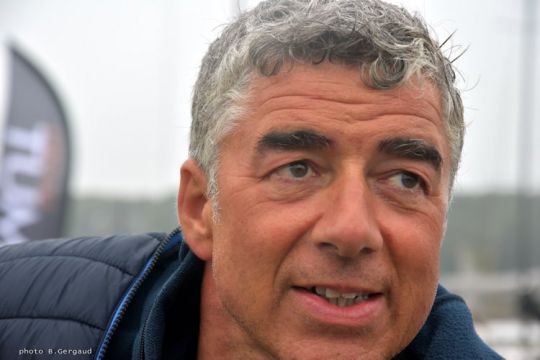
The sense of smell
When you've been at sea for a fortnight, of course, there's always the smell of iodine, but you get used to it. It's true that there's also the smell of his things, his clothes. But apart from that... That's why we're all the more sensitive when a different smell tickles our nostrils! I remember a Transgascogne, an IRC race between Pornic and Baiona in Spain. It's a hot summer morning and, in front of the boat, the fore-port of Baiona appears, in the pretty bay of Vigot. Beautiful sight, certainly, but also and above all, pleasant and intense scents: those of fragrant woods, unusual species for me who lives much further north, in Les Sables d'Olonne... I also remember, in 2003, during one of my first crossings of the Bay of Biscay, an arrival in Gijon, Spain, after four days of sailing with my wife Sandrine. We were literally drowned in a thick and very hot fog. Of course, we knew where we were thanks to our maps, but our eyes could do nothing more for us then! And then, a smell came to us, through this fog that surrounded us... As if it was carrying in the micro bubbles of water that probably make it up, these smells coming from elsewhere. The heavy smell of the coast warmed by the intense sunshine of this region, the fresh and natural scent of the trees, the gourmet smells of typical dishes cooked nearby... The fog finally lifted and revealed the origin of these mixed scents!
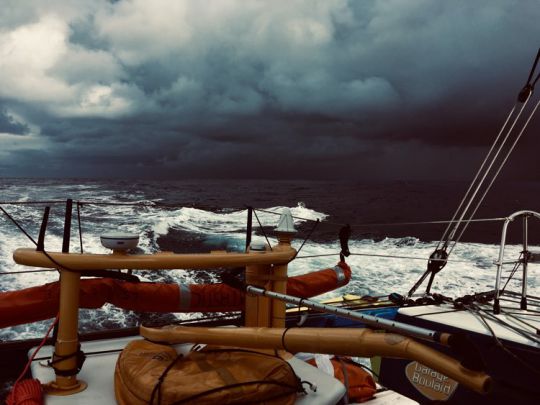
What about fear?
Because we spend a lot of time on the water, because it's our workplace in a way, it's our element in a way, we're constantly pushing our limits. For us - as for you, no doubt! - it's all about avoiding the panicky fear that makes people do stupid things. I stay in a controlled fear, and experience has taught me what to do to calm down the game if it really takes me too far. And with an IMOCA, this phenomenally powerful machine I'm sailing on, it can be complicated, it's true! Now, one specific fear I remember: it was during my first Transat Jacques Vabre in 2015, when in the Bay of Biscay, three or four lows followed one another, as I was telling you. So violent, that we saw boats breaking one after the other around us. In short, the fear there was that we too would suffer serious damage, and also put ourselves in danger. There is also not a "fear", but rather a sort of mistrust and caution mixed up, which I feel as we approach the Vendée Globe. The next one will be my first. We always apprehend what we don't know, I think. And then what sailor is not a little scared to the stomach at the idea of setting out to face the Southern Ocean? A hint of anxiety in the face of the unknown, in the face of your own reactions... Fortunately in the end, I experience many more moments of intense pleasure than fear!
